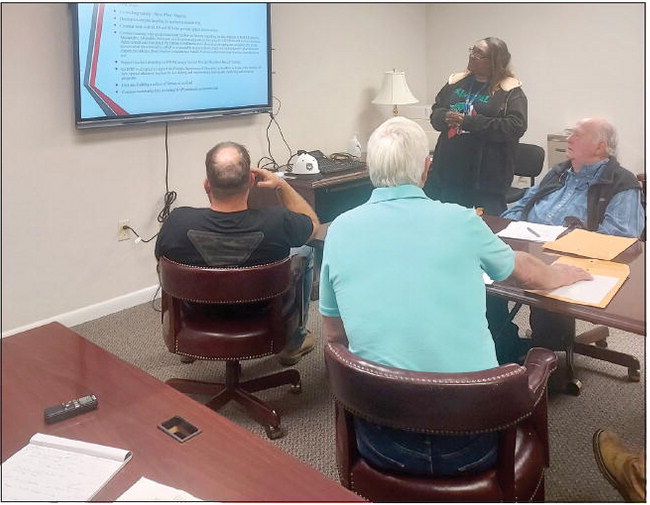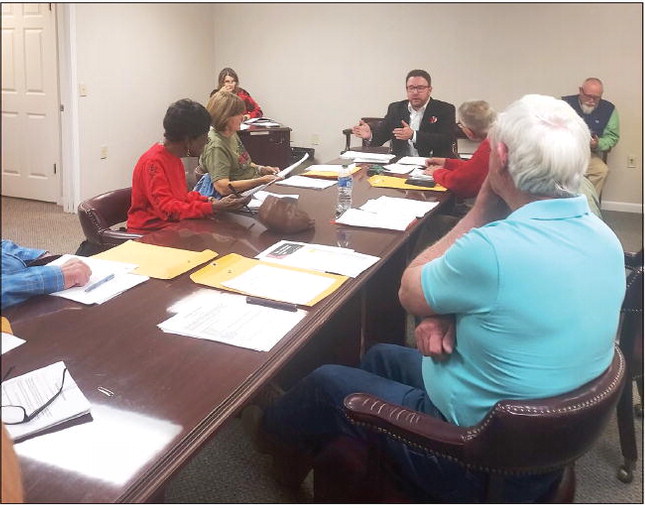Wheeler BOE Decides to Opt Out of HB581


In its last meeting of the year, the Wheeler County Board of Education unanimously decided to opt out of participating in a recently- approved statewide measure that will impact how education is financially supported in the community in the years ahead.
According to information issued by the Georgia House of Representatives, House Bill 581, which received a 62.9% approval from Georgia voters in the November 5 election, and passed with a 60.53% approval in Wheeler County, makes several changes to Georgia's property tax laws. It revises the definition of 'fair market value of property' to clarify how certain property valuations should be determined, and requires ad valorem property tax bills to include additional information, such as the estimated 'roll-back rate' that would result in no tax increase. It mandates that all parcels in a county be appraised at least every three years, and allows county boards of tax assessors to appeal sales ratio studies under certain conditions.
The measure also creates a new statewide adjusted base year homestead exemption for ad valorem taxes, which will allow a homeowner's assessed value to increase by no more than the inflation rate each year.
Finally, the measure imposes a 2% cap on local sales and use taxes, with exceptions for certain transportation and educational taxes, and allows for a new local option sales tax for property tax relief in certain jurisdictions that have a base year homestead exemption.
Known as the “Save Our Homes Act,” the measure is part of Lt. Gov. Burt Jones’s property tax reform priority and is intended to address longstanding issues with local property taxes. The act was passed in the last session of the Georgia Legislature, but required voter approval in a referendum before it could be put into motion. It amends Title 48 of the Official Code of Georgia Annotated.
This exemption will be automatically granted starting in 2025 unless local governments opt out by March 1, 2025 after holding public hearings. If no action is taken by a local entity, participation is automatic. Those entities choosing not to opt out will not have another opportunity to opt out.
New Superintendent of Wheeler County Schools Dr. Alex Alvarez attended the December 9 session of the Board of Education and provided Board members with more information on House Bill 581. He shared a handout from the Georgia School Superintendents Association which outlined the pros and cons of opting out. The reasons for supporting an opt-out included: Local Control Over Tax Policy: opting out allows local governments to maintain local control over their property tax policies, enabling them to tailor tax rates and exemptions to their specific community needs and fiscal conditions.
Flexibility in Rev enue Management: Local governments can adjust property tax assessments and rates without being constrained by the statewide cap. This flexibility can be crucial for addressing unique local economic conditions and funding needs for public services, such as schools, infrastructure, and public safety.
Potential for Higher Revenue: without the cap on property tax increases, local governments may be able to generate more revenue in times of financial need, especially in areas with rapidly appreciating property tax values and substantial (growth). This additional revenue can support essential services and capital projects.
Compounding Ex emptions: Many school districts have existing property tax exemptions already in place (senior exemption, land use exemptions, Carter Burns, etc.) These exemptions likely will have a substantial impact on taxable property. A statewide restriction could have a compounding impact on the levying capacity for school districts. By opting out, the local districts retain the ability to access the needed revenue to meet their financial obligations.
The drawbacks from opting out include a potentially higher property tax burden for homeowners, particularly in areas with rising property values; the potential for lack of uniformity and predictability in the framework for taxation; the potential for public opposition; and possible impact on the housing market because of potentially higher and less predictable property taxes.
The GSSA handout stresses: “Opting out of HB 581 involves balancing the need for local revenue and financial flexibility against the benefits of property tax relief and predictability to homeowners. Each local government must assess its unique circumstances and priorities to make the best decision for its community.”
Board members learned that according to a recent GHSA survey, threefourths of the state’s school systems are choosing to opt out of participation in HB581.
The Wheeler County Commission, which must act on the decision to opt out of the measure separately from the School Board, is still pondering its next move.
House Bill 451
During the meeting, Dr. Alvarez also apprised the Board of a new state mandate requiring as of January 1, 2025, that all public entities in Georgia offer a supplemental benefit program for eligible first responders diagnosed with post-traumatic stress disorder (PTSD) resulting from exposure to line-of-duty traumatic events.
On May 1, Governor Brian Kemp signed the Ashley Wilson Act (HB451) into law. The act requires the state of Georgia and any local governments to provide and maintain specific Post-Traumatic Stress Disorder insurance coverage for all eligible full-time and part-time first responders. In the case of the Wheeler County School System, this would include the School’s two nurses and two public safety officers.
The Act creates onceper- lifetime financial safety nets to assist with uninsured costs associated with PTSD treatment and recovery. The Act insures that a first responder may access the benefits quickly and confidently without worrying about stigma or job loss. It does not impact employer health plans, which are required to provide coverage for PTSD and other mental health conditions. The Act requires both critical illness (lump sum) and long-term disability (income replacement) coverage. ATSI/District Plan of Support Juanita Williams, principal at Wheeler County Middle School, updated Board members on the progress being made in response to issues regarding special needs students.
The Middle School was identified in 2023 by the Georgia Department of Education as an Additional Targeted Support and Improvement (ATSI) facility based on the performance of its special needs students in English Language Arts. The School received $10,000 to support practices to increase student achievement in English Language Arts, and as part of its program to correct the issues, middle school administrators were required to present to the Board an overview of school performance and growth as the improvement process progressed.
Williams reported that data shows that progress is being made under the System’s District Plan of Support. “School improvement target scores have improved as the problems have been addressed.”
Methods for addressing the issues have included: the Special Education Department working with regular classroom teachers to ensure that accommodations/ modifications are clear; as well as teachers training in high level practices, specially- designed instruction, coteaching models and planning, student engagement , learning targets and success criteria, and new ELA standards. Ongoing classroom observations are being conducted and results are being discussed within the leadership team. Overall data, including strength and opportunities for growth are being shared with teachers. The Georgia Learning Resource System and Regional Education Services Agency have provided additional support and resources to help Wheeler teachers meet targets in the Plan of Support.
“We want our teachers to be accustomed to sitting down and planning lessons together. We all have to come together to collaborate if we are going to reach students and get them to where they need to be,” Williams emphasized.
Other Business
The Board approved meeting dates for 20252026: January 13, February 10, March 10, April 14, May 12, June 9, July 21, August 11, September 8, October 10, November 10, December 8. The Board meets at 6:30 p.m. in the Board Offices in Alamo. The Board took under advisement a proposed school calendar which will be voted on in the next Board session.
Greg Wilcher, Director of School System Facilities, reported that repairs to various School System structures following Hurricane Helene are slowly progressing as the System waits for contractors to complete tasks. “The new doors went up today for the bus shelter,” Wilcher said of the replacement of two roll-up doors blown out of the building during the storm has been accomplished. Trim has gone back up on soffits, the new batting cage at the ball field has been repaired, the dugout roof has been fixed, but lighting upgrades and fencing replacements are stalled at the moment.
The Board culminated the meeting by approving the hiring of Gwen Wood as part-time art instructor starting February 1.

UPDATE ON LEGISLATION — Dr. Alex Alvarez, new Superintendent of Wheeler County Schools, updates the Board of Education about House Bill 581, which affects property taxes, and House Bill 451, which mandates additional PTSD insurance for specific school employees.Photo by Deborah Clark






